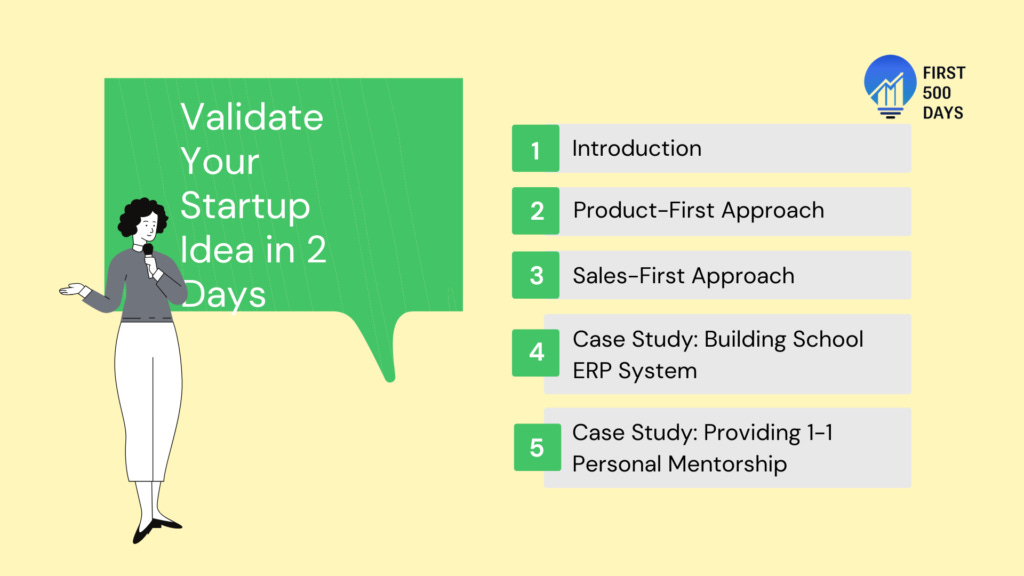Getting up with a startup idea is very easy but validating them in less time is an Art!
Hey Guys!
Thanks for opening today’s newsletter!!
In today’s edition, we will discuss the hack for validating startup ideas quickly.
Structure of this edition:
- Introduction
- Product-First Approach
- Sales-First Approach
- Case Study: Building School ERP System
- Case Study: Providing 1-1 Personal Mentorship
Keep reading!!
Introduction
To grow startups, you come up with great startup ideas on day to day basis. But it’s not necessarily that every idea is great and worthy of spending a lot of time.
So it’s necessary to learn the art of validating startup ideas quickly.
There are two approaches to validating startup ideas.
- Product-First Approach
- Sales-First Approach
Product-First Approach
This is a very common and traditional approach to validating ideas. Here,
- You come up with a startup idea
- Build the product or MVP on that idea
- Launch that into the market, and
- Validate your business thesis based on customer engagement.
Here you first build the product and then sell it. This is best to use when you are done with your market research. But in most cases, founders build innovative products on which market research doesn’t give much insights.
Cons of this Approach
- Very time consuming, generally take about 1-3 months
- Building a product on an initial hypothesis is not much useful
- Releasing the product in the initial target market requires marketing channels
- Your team efficiency also decides the course of action
Sales-First Approach
This approach is very effective when you have multiple theses of your startup idea. Here
- You came up with the idea
- Developed your business thesis on
- Who is Target Market
- What’s their Pain Point
- How you can help them (your services)
- Pricing
- Connect with the right user or customer and pitch your idea to them
- Observe their interest level and try to get payment from them
- If the customer is ready to pay? Congrats!! go to more customers
Here you first sell the product and then build it. This is best when you have to test your business thesis asap. This will give you clarity on what customers are looking for.
Pros of this Approach
- You can test any idea in a couple of days
- No need to build any product for the first interaction
- No need to create channels for promoting your product
- You get a lot of insights for improving your business thesis
Case Study: Building School ERP Software
Initial Context
In Sept 2019, after failing my 2nd startup, Waysals, my co-founder and I were looking for new ideas to try, but this time, we didn’t want to waste our time on building products which we did in the last startup, Waysals (we spent 1 year only in building product along with our graduation)
Our Business Thesis
Target Market: Medium to Large School Stakeholders (Administration, Teachers, Student & Parents) in Tier 1 & 2 cities
Problem: Less points of communication flow between them
Solution: Provide Complete ERP software to schools, teachers, students, and parents
Pricing: Similar to other competitors’ pricing
Idea Validation using Sales-First Approach
Day 1: We formulated our business thesis
Day 2: We visited a few schools to sell our product. We discussed this with them. We got their points and realized we need brochures to explain our idea in more detail.
Day 3: We make a proper brochure which includes services, software, and pricing
Day 4 & 5: We visited more schools to sell our product
Day 6: We moved on from this idea.
Conclusion: The market was already crowded. Most of the schools had their apps from 3rd party vendors. Many startups are providing similar services and have neck-to-neck competition. The market is Red Ocean.
Case Study: Providing 1-1 Personal Mentorship
Initial Context
In May 2020, my co-founders and I started UnchaAi in JEE space to provide a Personal AI Tutor. Within two weeks, we built our first MVP and released it in the market. Product failed! After that, we researched more on the idea and came up with a new business thesis.
Our Business Thesis
Target Market: Students preparing online + offline for IIT JEE
Problem: They work hard for preparation but fail to achieve what they deserve
Solution: Provide 1-1 mentorship, guidance, and doubt solving by IITians for their preparation
Pricing: More than the market price (1200 Rs/month/student)
Idea Validation using Sales-First Approach
Day 1: We called a student and pitched our service. One student gets convinced and ready to pay
Day 2, 3 & 4: We called more students, and 1 out of 3 students was willing to pay us
Day 5, 6 & 7: We got payment from 6 students
Day 8 onwards: Started planning of providing service and building product
Alright, that’s a wrap for today’s edition.
What Next?
If you liked this content, follow us on LinkedIn, Twitter, Instagram, and Youtube and share it with your friends.
You are welcome to join the Founders’ Community. The only community where you can network and learn from peer founders.
If you are building your startup, don’t forget to check out our upcoming Startup Cohort.
If you have any suggestions, I would be happy to listen here.re. out our upcoming Startup Cohort.If you have any suggestions, I would be happy to listen her


